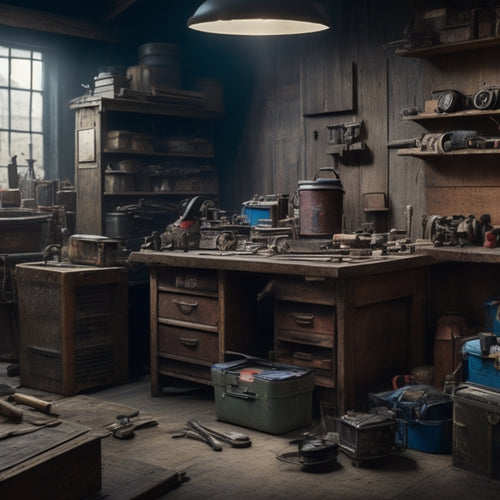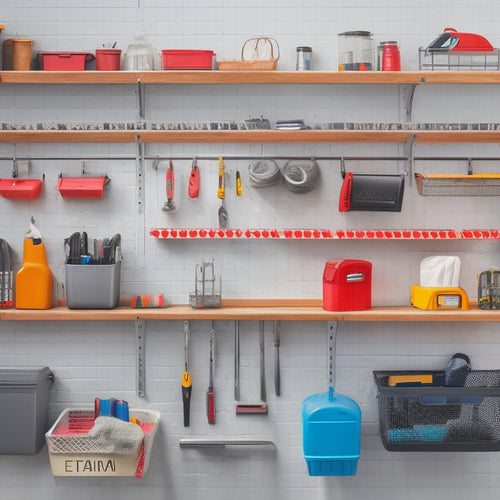
5 Best Small Tool Chest Organization Hacks
Share
Take your small tool chest to the next level by implementing these 5 organization hacks. Start by maximizing your vertical storage space with wall-mounted shelves and hooks. Next, label and categorize your tools into groups, making it easy to find what you need. Don't forget to utilize hidden compartments, like false bottom drawers, to stash small items. Implement a pegboard system to hang frequently used tools, and designate zones within your chest for each type of tool. By putting these hacks into practice, you'll be amazed at how much more efficient your workspace can be - and you'll want to explore even more ways to optimize your tool chest.
Key Takeaways
• Maximize vertical storage space by installing wall-mounted shelves, hooks, or pegboards to keep essential tools easily accessible.
• Label and categorize tools into groups like hand tools, power tools, and fasteners to simplify the tool identification process.
• Utilize hidden compartments like false bottom drawers, hidden shelves, and secret drawers to store small items and optimize tool chest space.
• Implement a pegboard system to hang frequently used tools and accessories, keeping them easily accessible and the tool chest organized.
• Designate specific zones within the tool chest for each type of tool, storing similar tools together for easy accessibility and quick identification.
Maximize Vertical Storage Space
Take advantage of the often-wasted space above your tool chest by installing wall-mounted shelves, hooks, or pegboards to store less frequently used items, freeing up valuable real estate for your go-to tools. This will help you make the most of your tool chest's vertical space, keeping your essential tools within easy reach.
Next, consider using wall-mounted hooks to hang items like cords, hoses, or accessories, keeping them organized and preventing tangles.
You can also install stackable bins or containers on the wall to store small parts, nuts, and bolts, or other miscellaneous items. This will help keep your workspace clutter-free and make it easier to find what you need when you need it.
Label and Categorize Tools
Organize your tools into categories, such as hand tools, power tools, and fasteners, and label each group so you can quickly identify where to find what you need. This will save you time and frustration when searching for a specific tool. Labeling each category will also help you maintain storage efficiency, ensuring that similar tools are stored together and easily accessible.
When categorizing your tools, consider grouping similar items together, such as all your screwdrivers or wrenches. This will make it easier to find what you need at a glance.
Use clear and descriptive labels, so you can quickly identify the contents of each category. For example, use labels like 'Hand Tools - Pliers' or 'Power Tools - Drills' to make tool identification a breeze.
Utilize Hidden Compartments
You can maximize your tool chest's storage capacity by incorporating hidden compartments that keep small items out of the way yet still accessible. This secret storage solution is perfect for stashing small tools, screws, or other tiny parts that can easily get lost. With clever concealment, you can utilize every nook and cranny of your tool chest.
Here are some ideas to get you started:
| Hidden Compartment Idea | Description |
|---|---|
| False Bottom Drawer | Create a false bottom in a drawer to store small items like screws or nails. |
| Hidden Shelf | Install a hidden shelf behind a removable panel to store small tools or parts. |
| Secret Drawer | Add a secret drawer behind a tool holder or other compartment to store valuable items. |
| Magnetic Strip | Attach a magnetic strip to the inside of a drawer or door to store small metal items. |
Implement a Pegboard System
By installing a pegboard system, you can hang frequently used tools and accessories within easy reach, freeing up valuable space in your tool chest for less frequently used items. This is a great way to optimize your tool chest's space and make the most of the room you have. With a pegboard, you can easily access the tools you need, without having to dig through your entire chest.
Here are some benefits of using a pegboard system:
-
Easy tool hanging: Hang your most frequently used tools, such as hammers, screwdrivers, and pliers, on the pegboard for quick access.
-
Space optimization: By hanging tools on the pegboard, you can free up space in your tool chest for less frequently used items, keeping your chest organized and clutter-free.
-
Customization: You can customize your pegboard to fit your specific needs, adding or removing pegs and hooks as needed.
Designate Zones for Tools
Designate Zones for Tools
With your pegboard system in place, categorize your tools into groups and designate specific zones within your tool chest for each type, ensuring that similar tools are stored together and easily accessible. This will help you quickly find what you need when you need it.
Here's an example of how you can organize your tool chest:
| Zone | Tool Type | Storage Solution |
|---|---|---|
| Hand Tools | Wrenches, pliers, screwdrivers | Tool rack placement, Tool pouches |
| Fasteners | Nails, screws, bolts | Drawer dividers, Magnetic strips |
| Power Tools | Drills, saws, sanders | Dedicated drawer or shelf |
| Measuring Tools | Tape measures, levels, calipers | Small tray or container |
Frequently Asked Questions
How Do I Keep Small Parts From Getting Lost in the Tool Chest?
To prevent small parts from getting lost, you'll want to use magnetic trays and drawer dividers to separate items, and implement a labeling system with foam inserts to keep everything organized and easily accessible.
Can I Use a Tool Chest With Wheels on Uneven Garage Floors?
You can use a tool chest with wheels on uneven garage floors, but make sure the wheels are sturdy and designed for portability, providing stability on rough surfaces, and consider anchor points for added security in your garage storage.
Are There Tool Chests With Built-In Charging Stations Available?
You're solving a puzzle, and finding the right tool chest is the missing piece. Yes, you can find tool chests with built-in charging stations, offering portability and compatibility with your devices, making your workflow seamless and efficient.
How Often Should I Clean and Maintain My Tool Chest Organization?
You should create a tool chest maintenance schedule to clean and organize your tools regularly, ensuring everything runs smoothly and efficiently, and maximizing the benefits of organized tool chests, like saving time and reducing stress.
Can I Customize a Tool Chest to Fit Non-Standard Tool Sizes?
You'll be thrilled to know that, yes, you can tailor a tool chest to fit those unusual tool sizes! Create custom tool inserts or use adjustable dividers to accommodate unique shapes and sizes, ensuring a snug, organized fit.
Related Posts
-

10 Best Tool Boxes for Every Budget and Job
You're looking for a tool box that fits your budget and job requirements. Whether you're a DIY enthusiast, electricia...
-

What Size Rolling Storage Bin Do I Need
To determine the ideal size of your rolling storage bin, you'll need to measure your storage space accurately, consid...
-

3 Simple Steps to a Garage Tool Wall You'll Love
To create a garage tool wall you'll love, start by planning the space, taking inventory of your tools, and measuring ...


